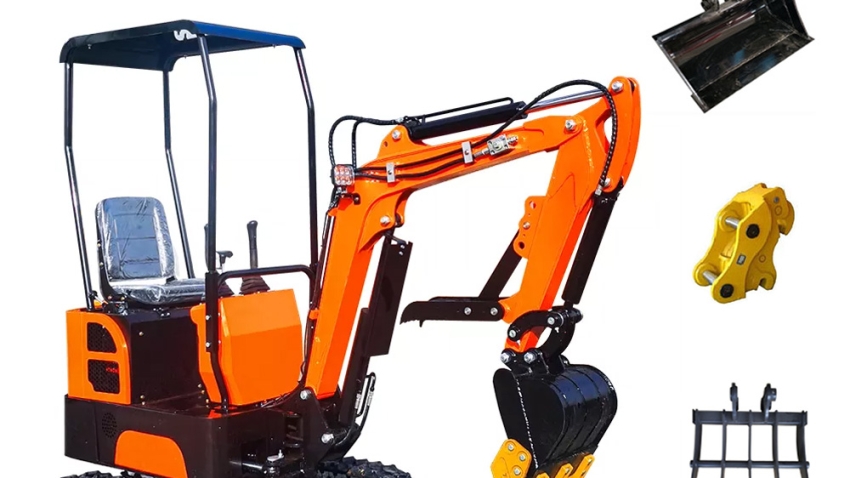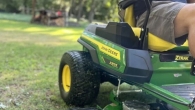
A Guide to Mini Excavators: Your Compact Powerhouse
Mini excavators, often referred to as “mini digs” or “micro excavators,” have become indispensable tools in construction, landscaping, and utility industries. Their compact size and maneuverability make them ideal for tight spaces, such as urban environments, residential yards, and confined construction sites. In this comprehensive guide, we’ll delve into the key features, benefits, and applications of mini excavators, helping you understand why they’ve gained such widespread popularity
Understanding Mini Excavators
At their core, mini excavators are smaller versions of traditional excavators. They typically weigh less than 10 tons and have a reduced operating radius compared to their larger counterparts. However, don’t let their size fool you. Mini excavators are packed with power and versatility, capable of performing a wide range of tasks efficiently.

Key Features of Mini Excavators
- Compact Design: Mini excavators are designed to fit into tight spaces, making them ideal for urban construction, landscaping, and utility work.
- Maneuverability: Their smaller size and zero-tail swing design allow for easy maneuverability in confined areas.
- Versatility: Mini excavators can be equipped with various attachments, such as buckets, breakers, augers, and grapples, to handle a wide range of tasks.
- Power: Despite their compact size, mini excavators are equipped with powerful engines that deliver sufficient torque for demanding applications.
- Operator Comfort: Modern mini excavators offer comfortable operator cabins with ergonomic controls and excellent visibility.

Benefits of Using Mini Excavators
- Increased Efficiency: Mini excavators can access areas that larger excavators cannot reach, improving efficiency and reducing project timelines.
- Reduced Damage: Their smaller size minimizes the risk of damage to property and infrastructure, especially in urban settings.
- Cost-Effective: Mini excavators are often more cost-effective than larger excavators, especially for smaller projects.
- Versatility: The ability to use various attachments expands their capabilities and makes them adaptable to different tasks.
- Environmental Friendliness: Many modern mini excavators are equipped with fuel-efficient engines and emission-reducing technology.
Applications of Mini Excavators
Mini excavators are used in a wide range of industries and applications, including:
- Construction: Site preparation, foundation excavation, trenching, demolition, and material handling.
- Landscaping: Tree removal, site grading, pond excavation, and landscaping feature installation.
- Utility Work: Trenching for pipes and cables, utility pole installation, and infrastructure maintenance.
- Residential Projects: Home renovations, backyard landscaping, and driveway installation.
- Agriculture: Orchard maintenance, land preparation, and small-scale farming tasks.

Choosing the Right Mini Excavator
When selecting a mini excavator, several factors should be considered:
- Project Requirements: Determine the specific tasks the excavator will perform and the necessary attachments.
- Worksite Conditions: Consider the terrain, access limitations, and any obstacles that may affect the excavator’s operation.
- Budget: Set a realistic budget and explore options within your price range.
- Operator Experience: Consider the experience level of the operator and select a model that suits their skill level.
- Maintenance Costs: Factor in ongoing maintenance costs, including fuel consumption, repairs, and servicing.

Mini Excavator Attachments
Mini excavators can be equipped with a variety of attachments to enhance their versatility and capabilities. Common attachments include:
- Buckets: Used for digging, grading, and material handling.
- Breakers: Used for breaking up concrete, rocks, and other hard materials.
- Augers: Used for drilling holes for fence posts, utility lines, and foundation footings.
- Grapples: Used for handling logs, debris, and other bulky materials.
- Hammer: Used for driving piles and posts.
- Tiltrotator: A rotating attachment that allows for precise positioning and increased flexibility.
Lower environmental impact compared to larger machinery
Reduced Fuel Consumption and Emissions
- Smaller Engines: Mini excavators typically have smaller engines compared to traditional excavators, resulting in lower fuel consumption and reduced emissions of greenhouse gases like carbon dioxide.
- Improved Fuel Efficiency: Modern mini excavators are designed with fuel-efficient engines and advanced fuel injection systems, further reducing their environmental footprint.
Minimized Site Disturbance
- Smaller Footprint: The compact size of mini excavators minimizes the amount of ground disturbed during operations, preserving natural habitats and reducing erosion.
- Targeted Excavation: Mini excavators can be more precise in their excavations, limiting the amount of unnecessary digging and reducing the overall impact on the environment.
Reduced Noise Pollution
- Quieter Engines: Mini excavators often have quieter engines and noise-reduction features, reducing noise pollution and minimizing disturbance to local communities and wildlife.
Fewer Transportation Emissions
- Portability: Mini excavators are often more portable than larger excavators, reducing the need for long-distance transportation and associated emissions.
Enhanced Sustainability
- Adaptability to Green Practices: Mini excavators can be adapted to support sustainable construction practices, such as using recycled materials and minimizing waste generation.
- Reduced Environmental Risk: The smaller size and reduced environmental impact of mini excavators make them a more sustainable choice for many projects.
Case Studies
- Urban Redevelopment: In urban areas, mini excavators are often used to demolish buildings and prepare sites for new construction with minimal disruption to the surrounding environment.
- Landscaping and Tree Removal: Mini excavators can be used to remove trees and prepare land for landscaping projects, reducing the impact on existing vegetation and minimizing soil erosion.
- Utility Infrastructure Installation: Mini excavators are ideal for installing underground utilities, such as pipes and cables, with minimal disturbance to the surrounding landscape.
Mini excavators offer a significant advantage in terms of environmental impact compared to larger machinery. Their smaller size, reduced fuel consumption, and minimized site disturbance make them a more sustainable choice for a wide range of applications. By adopting mini excavators, businesses and individuals can contribute to a more environmentally friendly and sustainable future.
Safety Considerations
Safety is paramount when operating a mini excavator. Here are some important safety guidelines:
- Operator Training: Ensure that operators are properly trained and certified to operate the excavator safely.
- Regular Inspections: Conduct regular inspections of the excavator to identify and address any potential safety hazards.
- Safe Work Practices: Follow safe work practices, such as avoiding overhead hazards and maintaining a clear work area.
- Personal Protective Equipment (PPE): Wear appropriate PPE, including hard hats, safety glasses, and hearing protection.

Training for operators on proper usage and maintenance
Proper training is essential for operators to maximize the efficiency, safety, and longevity of mini excavators. By equipping operators with the knowledge and skills necessary for safe and effective operation and maintenance, businesses can reduce accidents, minimize downtime, and protect their investment in this valuable equipment.
Key Training Areas
-
Safety First:
- Operator Safety: Teach operators about personal protective equipment (PPE), such as hard hats, safety glasses, and hearing protection, and how to use them correctly.
- Machine Safety: Instruct operators on the proper use of safety features, including emergency stop buttons, rollover protection systems (ROPS), and fall protection devices.
- Site Safety: Emphasize the importance of assessing the worksite for potential hazards, such as underground utilities, unstable ground, and overhead obstructions.
-
Machine Operation:
- Controls and Functions: Teach operators how to operate all controls, including the joysticks, pedals, and switches, and explain the functions of each.
- Safe Operating Practices: Instruct operators on proper techniques for digging, grading, and material handling, emphasizing the importance of avoiding overloading the machine.
- Emergency Procedures: Train operators on how to respond to emergency situations, such as machine breakdowns, spills, or injuries.
-
Pre-Operation Inspections:
- Daily Checks: Teach operators how to conduct daily inspections of the excavator, including checking fluid levels, tire pressure, and the condition of the tracks and attachments.
- Identifying Defects: Train operators to recognize and report any signs of damage, wear, or malfunction.
-
Basic Maintenance:
- Lubrication: Instruct operators on how to lubricate moving parts according to the manufacturer’s recommendations.
- Cleaning: Teach operators how to clean the excavator regularly to remove dirt and debris that can cause damage.
- Minor Repairs: Train operators on how to perform minor repairs, such as replacing filters and belts.
-
Attachment Usage and Maintenance:
- Attachment Selection: Teach operators how to select the appropriate attachment for different tasks.
- Attachment Operation: Instruct operators on how to operate each attachment safely and effectively.
- Attachment Maintenance: Teach operators how to maintain attachments, including cleaning, lubricating, and inspecting for damage.
Training Methods
- Classroom Instruction: Provide classroom training that covers the theoretical aspects of mini excavator operation and maintenance.
- Hands-on Training: Offer practical training sessions where operators can practice operating and maintaining the excavator under the guidance of experienced instructors.
- Simulation Training: Use simulators to provide operators with a safe and controlled environment to practice their skills.
- On-the-Job Training: Supervise operators as they work on real projects to provide hands-on experience and guidance.
Continuous Improvement
- Regular Refresher Training: Provide regular refresher training to ensure that operators stay up-to-date on safety procedures, maintenance practices, and new technologies.
- Performance Evaluation: Conduct regular performance evaluations to identify areas for improvement and provide additional training as needed.
- Feedback and Suggestions: Encourage operators to provide feedback and suggestions for improving training programs and safety procedures.
By investing in comprehensive training for mini excavator operators, businesses can enhance safety, efficiency, and productivity while protecting their equipment and minimizing costs.
Mini excavators have revolutionized the construction, landscaping, and utility industries. Their compact size, maneuverability, and versatility make them indispensable tools for a wide range of applications. By understanding the key features, benefits, and applications of mini excavators. You can make an informed decision and select the right model to meet your specific needs.












Leave a Reply